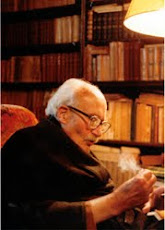A youth’s revolutionary activity is the rite of passage between adolescence and the bourgeoisie.
Escolios a un Texto Implícito: Selección, p. 296
September 2, 2010
Subscribe to:
Post Comments (Atom)
English translations of the aphorisms of Nicolás Gómez Dávila

The original is:
ReplyDeleteLa actividad revolucionaria del joven es el “rite de passage” entre la adolescencia y la burguesía.
The phrase "rite de passage" is French, and it simply means "rite of passage."
ReplyDeleteHere is an interesting passage that may shed some light on this aphorism, from Yuri Slezkine, The Jewish Century (Princeton: Princeton University Press, 2004), p. 142:
ReplyDelete"Hierarchical, patriarchal, circumscribed families were being replaced [among Russian Jews and the Russian intelligentsia in the 1860s] by egalitarian, fraternal, and open-ended ones. The rest of the world was to follow suit.
"All modern societies produce 'youth cultures' that mediate between the biological family, which is based on rigidly hierarchical role ascription within the kinship nomenclature, and the professional domain, which consists, at least in aspiration, of equal interchangeable citizens judged by universalistic meritocratic standards. The transition from son to citizen involves a much greater adjustment than the transition from son to father. Whereas in traditional societies one is socialized into the 'real world' and proceeds to move, through a succession of rites of passage, from one ascriptive role to another, every modern individual is raised on values inimical to the ones that prevail outside. Whatever the rhetoric within the family and whatever the division of labor between husbands and wives, the parent-child relationship is always asymmetrical, with the meaning of each action determined according to the actor's status. Becoming a modern adult is always a revolution.
"There are two common remedies for this predicament. One is nationalism, with the modern state posing as a family complete with founding fathers, patriotism, a motherland, brothers-in-arms, sons of the nation, daughters of the revolution, and so on. The other is membership in a variety of voluntary associations, of which youth groups are probably the most common and effective precisely because they combine the ascription, solidarity, and intense intimacy of the family with the choice, flexibility, and open-endedness of the marketplace."